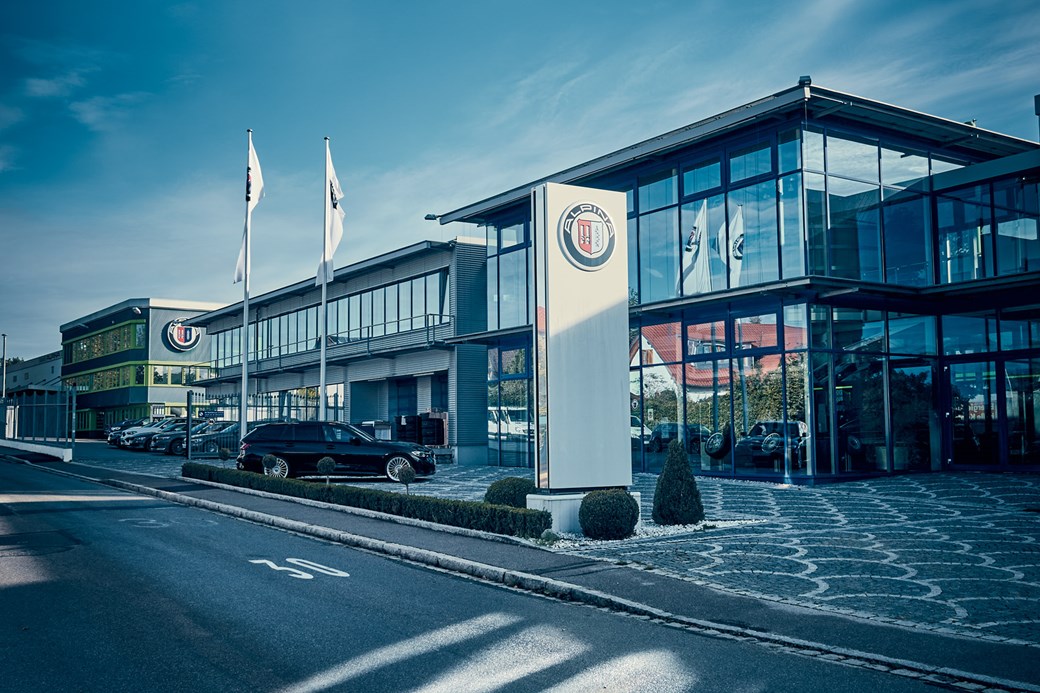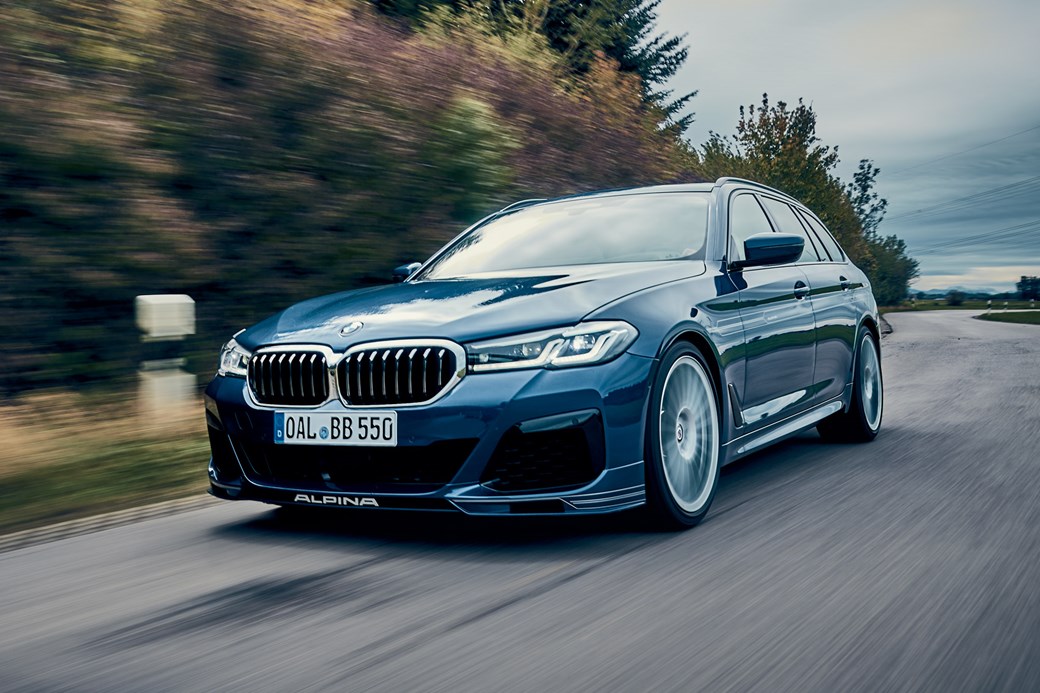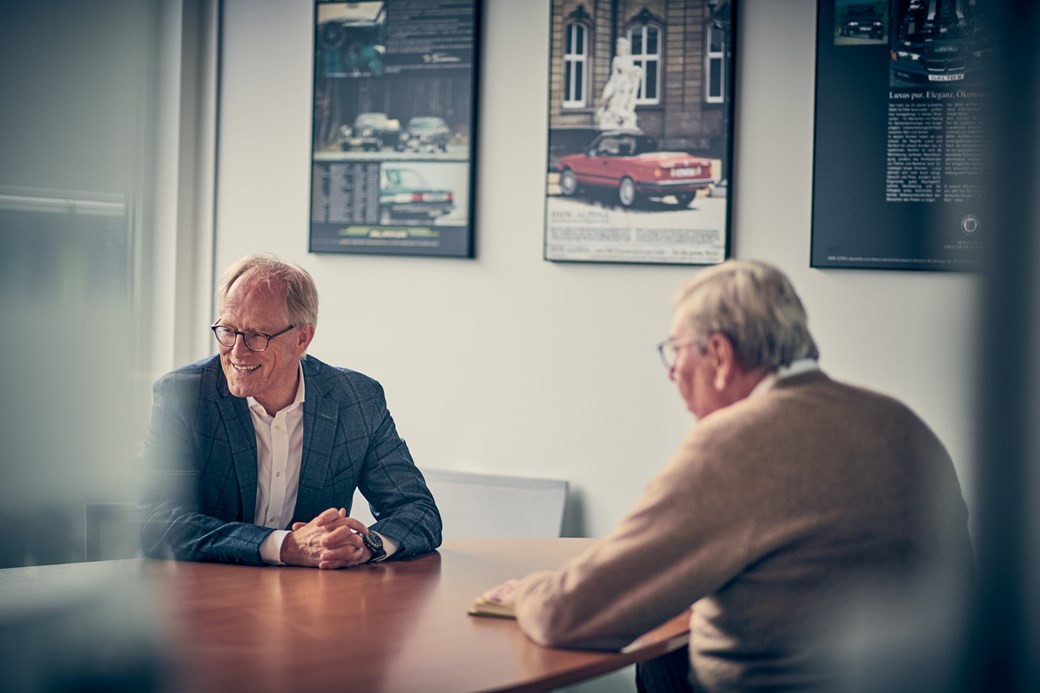|
Moderator
Drives: F32 435i Luxury & G26 i4 35
Join Date: Nov 2010
Location: Leicestershire
|
Inside Alpina: the long shadow of BMW
So I thought that this was a brilliant interview with the chaps at Alpina. It is a bit of a long read but really provided some insight into the future of Alpina with EVs and how they may plan to over come the petrol/diesel/EV decisions.
Quote:
Nothing changes at Alpina. There was a designer once, but he wasn't replaced. No need. The look, the feel, everything was decided early on, and hasn't needed to change because it was all spot-on from the start.
Everything must change at Alpina. When all your products are derived from BMWs, and BMW is busy ditching diesel and embracing electrification, you have no choice but to follow suit. But how do you do that without losing what's made the unchanging Alpina formula such a winner for 55 years?
This is the big question I've come to Buchloe, 60 miles west of Munich, to ask Andreas Bovensiepen, son of founder Burkard Bovensiepen. While I'm here I drive the new B5 – a car so brilliant, and so very Alpina, that it might as well have been designed specifically to demonstrate just how precious Alpina is. But also, let's face it, how weird it is that Alpina still exists.
It's not unusual for external tuning companies to have a close relationship with a major manufacturer, like Abt with Audi and Brabus with Mercedes. But Alpina's connection with BMW is much closer. And whereas Abt and Brabus are essentially tuners and modifiers who make hotter versions for hard-bitten petrolheads, the Alpina approach is considerably more nuanced, with comfort and luxury high on the agenda. It has, since 1983, been officially categorised as a manufacturer, not a tuner. Most of the assembly work on any Alpina is done on BMW production lines, but to Alpina spec. And while BMW won't be making an estate version of the M5, it's happy to facilitate Alpina's B5, which is very much an M5 estate.
The B5 was not born to eclipse the M5, despite the Alpina's advantages in terms of torque and top speed. Instead, it comes across as a more rounded, better balanced, less aggressive, more comfortable and ultimately a little more desirable multi-purpose driving machine. Even with the optional trademark silver or gold stripework created in the early '70s by the brand's one and only, now long-deceased, in-house designer, the ultimate 5-series is an enthralling undercover fast-lane hero as well as the uncrowned king of winding roads quick enough to be tackled in third gear and up.
The bespoke bumpers are fairly subtle aero and cooling aids, the silver multispoke turbine wheels have been an Alpina fixture for decades and the range of available cabin treatments still varies from functional with a twist to old-school opulent. Burkard Bovensiepen, now 84, prefers his personal car to be painted Alpina blue or Alpina green with glossy dark-veined elm veneer and small chequered leather insets.
The B5 saloon does 0-62mph in 3.4sec, 0.1 slower than the M5 Competition saloon. It passes 125mph after only 11.4sec and peaks at 205mph. The 4.4-litre BMW V8 on Alpina steroids delivers 613bhp and 590lb ft, slightly down on the M5 Comp's power but 37lb ft up on its torque. But don't think of it as a close race; it's in fact an intriguing choice between two different characters. Where the M is sharp, sporty, spicy, the B is balanced, refined, compliant. While the BMW is at its best in Sport Plus, the Alpina gains a Comfort Plus mode. When it comes to suspension malleability, more traction-orientated xDrive calibration, and the sensitive integration of electronic and mechanical driving aids, the real centre of competence for vehicle dynamics is Buchloe rather than Garching. The M5 may be more fun to drive in the old-fashioned way – noise, tautness, response, involvement – but the B5 is the smoother operator, more relaxed long-distance cruiser and finer all-rounder, especially in Touring form.
Since Burkard Bovensiepen retired from day-to-day duties in early 2020, sons Andreas, 58, and Florian, 54, have been jointly in charge of the 300 employees. While Florian is a full-on numbers guy, Andreas divides his focus between business and product. He started his career in the BMW chassis department before being appointed project leader of the Z8 programme. After seven years in Munich, the tall and lanky part-time race driver and hobby pilot returned to his family roots where his father ran the car and (from 1979) wine business.
Ever since Burkard created an innovative twin-carb version of the BMW 1500 back in 1965, Alpina has made no major strategic move without prior consent from the BMW HQ. In principle, the petrolheads from the Allgäu are free to do their own thing, but in reality every single project needs big brother's blessing. It's a harmonious two-way relationship; behind closed doors, the Buchloe R&D wizards have been working for years on selected BMW projects and components. The most recent commission concerned the completion of a bunch of personalised last-of-line i8s.
Andreas Bovensiepen is passionate on the overlapping subjects of continuing to build fast cars in a changing environment: which technologies future markets need; the opportunities for growth, and the risks; and the emotional and pragmatic clash between today's twin-turbo V8s and the uncertain high-voltage future. His cautious side has been dominant recently: not a single new employee hired in the first 10 months of 2020, expansion plans on ice, Covid-19 slowing down the supply of cars from BMW, and the prospect of small-volume manufacturers having to renegotiate the CO2 exemptions granted by the EU. Despite the solid order bank, there has been the odd clot in the cashflow, so even the smallest investment comes under heavy scrutiny.
'These days, nothing at all can be taken for granted,' he tells me. 'At present, the CO2 limit we must meet is a relatively do-able 214g/km, but the roadmap will impose much tougher rules. We have, in other words, no choice but to start offering plug-in hybrids in the not too distant future and to seriously consider our own EV.
'The V8, which is part of our DNA, won't fit the picture forever. As a result, we are closely monitoring BMW's efforts with regard to EVs. One thing is clear: Alpina cannot afford to go its own independent way in terms of alternative propulsion systems. The next five to 10 years are thus an absolutely critical timeframe.'
Although insiders insist BMW will still be making the V8 through to 2031, the next B5 due in 2025 almost certainly needs a plug-in hybrid option based on the 3.0-litre straight six. Since possible modifications to the combustion engine like a pre-chamber direct-injection system would break the budget, the only alternative measure is specific software tuning related to performance electronics and battery management. Thanks to pending packaging improvements, bigger PHEV batteries are also within reach.
We're talking in Alpina's higgledy-piggledy Lego-castle HQ, a vast building complex extended bit by bit over time, constructed mainly from prefab washed concrete elements complemented by trademark blue and green accents. The building started modestly in the '70s, when this part of Buchloe was still dotted with fields, farms and small houses. Now, the site is bursting at its seams, a jumble of brick-built three-storey facilities, large single-storey halls and small temporary storage areas. With a logic that's not obvious to the outsider, there are test benches here, the sales and marketing team there, the development department somewhere that way, the leather and wood shop round the corner... And it's stuffed to the last corner with cars old and new; camouflaged BMW factory prototypes, briefly resting Alpina mules, secondhand specials awaiting TLC. And there are rows of locked grey steel doors marked with No Entry and No Photography signs. The main complex accommodates reception, a miniature showroom with adjoining makeshift lounge and a first-floor area for conferences. It's a bricks-and-mortar time machine casually refurbished with dots of blue paint, and – since it's come this far – you can easily imagine it soldiering on through the next decade. You certainly hope so.
Like the big players, Alpina is ping-ponging between confidence and concern. Concern, because cottage car makers are merely passengers on the train to electric tomorrowland. Confidence, because the good times may well last long enough to properly prepare the shape of things to come.
'I'm not certain how long the diesel will last,' concedes Andreas. 'In big markets like Germany and Japan, diesel and petrol are currently an even split for Alpina, and with 75 per cent repeat customers, the contribution of D3, D5 and XD3/4 to the bottom line is significant. Short term, it may help us that BMW has recently discontinued its own quad-turbo high-end diesel. Mid-term, however, the acceptance in Europe is bound to drop as the tailpipe regulations become tougher and tougher. The next problem child is the petrol-fed V8, which faces its own CO2 issues, to be followed by the inline six. On the petrol front, we can perhaps cushion the impact with the help of synthetic fuels. But at the end of the day it's the total cost of ownership and the customer experience that counts. Most users do high mileages, and the Alpina is their only car. Finding a formula that keeps them happy and in the fold isn't going to be easy.'
A PHEV pack adds about 250kg to cars which are bought primarily for their nimbleness and agility. The only way to compensate is by ensuring a best-in-class electric driving range – and in this case best-in-class means better than BMW. That's why Alpina needs to hire software specialists, chemical engineers and mechatronics experts to develop superior algorithms, faster charge and slower discharge cycles, and a more efficient interaction with the combustion engine. At the same time, this remapped electronic DNA must emphasise the marque's dynamic strengths without hurting the vehicle characteristics. All this has to happen in the next three years before the new 5-series (G60) and 7-series replacement (G70) hit the road. While protecting its customary niche where displacement and the number of cylinders still matter for as long as possible, Alpina is expected to start offering six-cylinder PHEV drivetrains even in models like the 3-series where BMW may favour the four. At the same time, the brothers in charge intend to zoom in on higher-margin models like the 8-series and the X7.
But don't they also sometimes think the unthinkable and wonder about striking out on their own, I ask. How about venturing into supercar terrain with a 100 per cent pure Alpina? 'No chance,' answers Andreas. 'Way back when [in the early '90s], we briefly considered building Giugiaro's BMW Nazca concept [initially intended to replace the M1] in small numbers, but the ends just wouldn't meet. We've also looked at a continuation series of the i8 with a four-cylinder engine, yet again there was no business case. Even offbeat ideas like planting the V8 into the B3 xDrive were quickly killed by costs. True, a new two-door Alpina would be nice to have, but there is not enough room for such a car next to the M4 and the M2 CS. Perhaps the 4-series Gran Coupe is a more feasible opportunity.'
Alpina doesn't plan to make variants on the increasingly popular 1-series, 2-series, X1 and X2, because it doesn't have the capacity and the margins wouldn't be worthwhile. And it won't be creating anything based on the X5, X6 and upcoming X8, because BMW says they're off limits. But don't rule out a possible involvement with the Bespoke division, intended to push Mini upmarket.
Which upcoming electric BMWs would Alpina like to work on? The i4 and i7 are of particular interest. But the very first battery-powered Alpina may well be an evolution of the iX3. How come? Because the boys from Buchloe need a quick fix, just in case the regulator tightens the rules faster than expected. Made in China by the joint venture between BMW and Brilliance, the iX3 is genetically spot-on for a timely cosmetic makeover paired with a power and range upgrade. In addition, the rear-wheel-drive crossover could benefit from the proven Alpina chassis treatment for even sportier handling in combination with a more comfortable ride.
Asked whether Alpina would consider more extensive design changes to offset increasing underbody similarities, Andreas sternly shakes his head: 'No way. We are partners, friends, allies. Out of principle, we do nothing to upset BMW. Without their backing, Alpina would sink faster than the Titanic. That's why we discuss every little detail, and there is no doubt who has the final say.'
|
Source: https://www.carmagazine.co.uk/featur...inside-alpina/



|

























